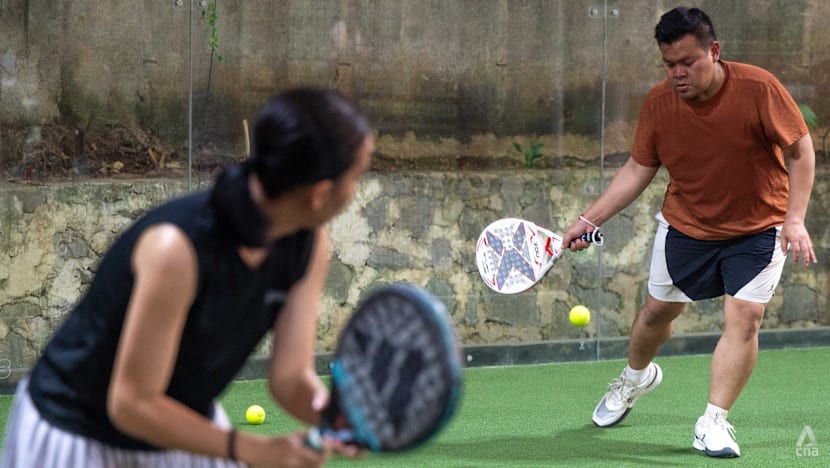Top Stories
Jakarta Residents Protest as Padel Courts Replace Football Field

A significant debate has erupted in South Kedoya, Jakarta, over plans to transform the community’s only public football field into a pay-to-play padel court. Residents expressed their dissatisfaction after learning of the proposal in July, with many taking to social media and displaying protest banners. Local resident Suhardian, 34, voiced the sentiment of many, saying, “This field has existed since my grandfather’s time. Where would the kids play football if it’s gone?”
Football coach Sumiran noted the field’s importance, highlighting its regular use throughout the week. “This morning at 6 a.m., young kids were already practicing. By 2 p.m., another youth academy team from Kedoya arrives. This field never sleeps,” he said during an interview.
After weeks of community protests, the local government reversed its decision to build the padel court. Residents, however, seek written confirmation to safeguard the space from future developments. Jayadi, 50, president of a local community organization, emphasized the issue of fairness. He remarked that padel, being more associated with the upper-middle class, tends to serve outsiders rather than local residents. “In Kebon Jeruk, there are only two football fields used by local residents, mostly from the lower and middle class,” he stated.
The controversy in South Kedoya reflects a broader discussion in Jakarta regarding the rapid rise of padel as a popular sport. Arrie Nugraha, 41, an enthusiast of both football and padel, criticized the conversion of public spaces into exclusive venues. “These spaces should remain free for community sports, not become exclusive venues for a select few,” he asserted.
Rising Popularity of Padel
Padel, a hybrid of tennis and squash, is one of the fastest-growing sports globally. In Southeast Asia, nations such as Malaysia, Thailand, and Singapore have witnessed significant interest, and Indonesia’s growth has been particularly remarkable. According to the International Padel Federation, approximately 100 clubs and 350 courts have opened across Indonesia in the past two years. The country now ranks as the sixth fastest-growing padel market in Southeast Asia and the 29th globally, as reported by Koni, Indonesia’s sports governing body.
In Jakarta, new rooftop courts and repurposed sports arenas are emerging almost monthly. Yet, demand often exceeds supply, with players needing to book courts weeks in advance. Julius Putra, 41, who began playing padel earlier this year, explained, “To play now, you either need to reserve a month ahead or join a club’s network.”
Social and Lifestyle Impact
Padel has rapidly become a lifestyle trend in Jakarta, attracting corporate leagues and influencer tournaments. “The community is exploding. New courts open every month, and gear is sold everywhere now,” said Arrie. Social media has played a crucial role, with influencers showcasing match highlights and courtside selfies. “I’ve seen players pop bottles of drinks mid-game on the court,” he added.
The sport’s rise has also influenced Jakarta’s nightlife. Tito Tri Putra, 41, a general manager based in Bali, noted a noticeable decline in nighttime activities as more people opt for early morning padel sessions. “The nightlife scene has slowed down because everyone’s waking up early to play padel at 6 a.m.,” he remarked.
Operating Hours and Demand
To accommodate the increasing demand, several court operators have extended their hours. Ryan Ng, who manages the padel courts at the Avion Sports Center in North Kedoya, stated, “Demand has been stable and has exceeded our expectations. Since opening, we have been operating 24 hours because there are people who want to play at 1 a.m. or dawn.”
During Ramadan, the demand surged even more. Tito shared that players booked slots at 2 a.m. or 3 a.m., just before their pre-dawn meal.
Currently, court rentals in Jakarta average 400,000 rupiah (approximately US$30) per hour, with racquets priced between 1 million rupiah and 7 million rupiah. Despite the introduction of a 10 percent entertainment tax on the sport in May, interest remains robust. “Doesn’t really matter,” said Arrie. “The amounts are not that big when you split it between the players.”
As the popularity of padel continues to grow, the balance between private interests and community needs remains a pressing issue for residents of South Kedoya and beyond.
-

 Business5 months ago
Business5 months agoKenvue Dismisses CEO Thibaut Mongon as Strategic Review Advances
-

 Lifestyle5 months ago
Lifestyle5 months agoHumanism Camp Engages 250 Youths in Summer Fest 2025
-

 Sports5 months ago
Sports5 months agoDe Minaur Triumphs at Washington Open After Thrilling Comeback
-

 Sports5 months ago
Sports5 months agoTupou and Daugunu Join First Nations Squad for Lions Clash
-

 Top Stories5 months ago
Top Stories5 months agoColombian Senator Miguel Uribe Shows Signs of Recovery After Attack
-

 Health5 months ago
Health5 months agoNew Study Challenges Assumptions About Aging and Inflammation
-

 World5 months ago
World5 months agoASEAN Gears Up for Historic Joint Meeting of Foreign and Economic Ministers
-

 World3 months ago
World3 months agoSouth Korea’s Foreign Minister Cho Hyun to Visit China This Week
-

 Business5 months ago
Business5 months agoOil Prices Surge Following New EU Sanctions on Russia
-

 Entertainment5 months ago
Entertainment5 months agoDetaşe-Sabah Violin Ensemble Captivates at Gabala Music Festival
-

 Business3 months ago
Business3 months agoStarling Bank Plans Secondary Share Sale, Targeting $5.4 Billion Valuation
-

 Entertainment5 months ago
Entertainment5 months agoBaku Metro Extends Hours for Justin Timberlake Concert









